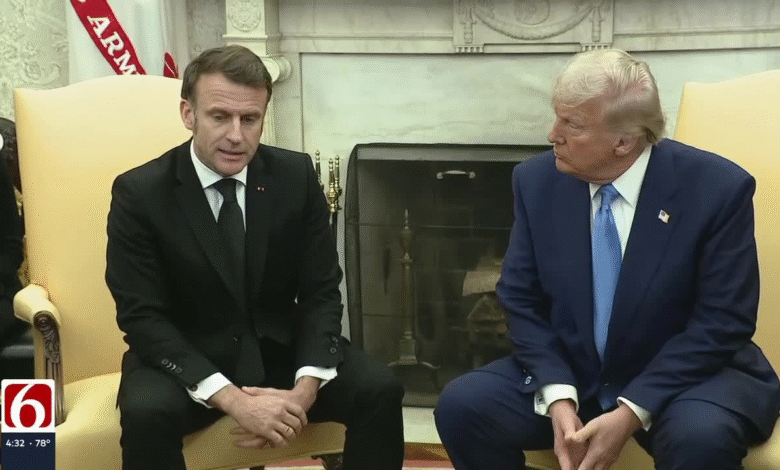Ukraine Economic Deal: U.S. Partners for Recovery

The newly announced Ukraine economic deal marks a significant milestone in U.S. relations with the war-torn nation, as it lays the groundwork for investments in vital natural resources. This agreement comes amidst ongoing efforts to rebuild and revitalize the Ukrainian economy, emphasizing the U.S.-Ukraine partnership and mutual commitment to stability and prosperity. Treasury Secretary Scott Bessent highlighted that the established U.S.-Ukraine Reconstruction Investment Fund aims to unlock Ukraine’s growth assets, boosting economic recovery Ukraine desperately needs. With a focus on co-ownership and responsible management of resources, this deal signifies a shift towards greater autonomy for Ukraine in its natural resource sector. As such, the Trump Administration’s vision for Ukraine evolves, intertwining American and Ukrainian interests for a sustainable economic future.
The recently forged economic agreement between the United States and Ukraine ushers in an era of collaborative investment aimed at fortifying Ukraine’s resource management capabilities. This partnership is not merely transactional; it symbolizes a broader commitment to revitalize a country ravaged by conflict, emphasizing shared goals of sovereignty and prosperity. Officials have articulated a dedication to ethical investment practices, ensuring that past adversaries do not profit from Ukraine’s resurgence. The now-established reconstruction fund is poised to play a pivotal role in channeling financial resources towards the extraction of critical minerals and energy sources, thus accelerating the nation’s recovery. Through this initiative, both nations are taking significant strides to address historical grievances while building a resilient economic foundation.
Significance of the U.S.-Ukraine Economic Deal
The newly signed economic deal between the United States and Ukraine is a landmark moment for both nations, particularly in the aftermath of prolonged conflict. This partnership aims to revitalize Ukraine’s economy and bolster its recovery by ensuring that both countries invest in its natural resources responsibly. The establishment of the U.S.-Ukraine Reconstruction Investment Fund reflects a strategic move to facilitate investment opportunities that could significantly fuel economic growth in Ukraine.
Moreover, this deal constitutes reaffirmation of the U.S.’s commitment to Ukraine’s sovereignty amid ongoing tensions with Russia. Treasury Secretary Scott Bessent emphasized that this economic partnership is not only about financial aid but also about creating a sustainable framework for cooperation that underscores long-term peace and stability in the region. The new investment fund intends to effectively harness Ukraine’s extensive natural resources, promoting a shift from foreign dependency to self-sufficiency and resilience.
Natural Resources Management Under the New Agreement
One of the key aspects of the economic deal is the structured approach to managing Ukraine’s natural resources. The agreement delineates clear stipulations, such as the exclusive determination of resource extraction by the Ukrainian state, allowing it to retain ownership of its subsoil. This approach aims to eradicate past injustices where external entities benefited from Ukraine’s resources, ensuring that profits are channeled back into the national economy and used to aid recovery efforts.
Furthermore, the dual management of the investment fund signifies a unique collaboration framework between Ukraine and the U.S., where both parties are encouraged to collaborate rather than compete. This innovative model positions Ukraine to leverage its resources effectively while attracting investments from the U.S., ultimately aiming for an economic resurgence that hinges on both responsibility and sustainability.
Boosting Economic Recovery in Ukraine
The economic deal represents a pivotal step in the broader context of Ukraine’s economic recovery. By establishing a dedicated investment fund, the U.S. aims to play an integral role in supporting Ukraine’s endeavors to restore its economy post-conflict. The collaboration will stimulate investment in key sectors, particularly oil, gas, and critical minerals, aligning perfectly with the current global demand for clean energy alternatives. This strategic alignment not only promises to generate revenue but also creates jobs and promotes innovation within Ukraine.
Additionally, the commitment to redirecting a significant portion of profits from resource licenses back into the fund reinforces the sustainable development agenda. This model could serve as a blueprint for future economic programs, showcasing how international partnerships can successfully drive local economic growth while ensuring that communities benefit from the exploitation of their own natural resources.
Implications of the Trump Administration’s Ukraine Strategy
The Trump Administration’s proactive approach towards Ukraine has far-reaching implications, particularly concerning geopolitical strategy and economic partnerships. By promoting an economic deal that emphasizes Ukraine’s sovereignty and resource ownership, the administration signals a break from past policies that often sidelined local interests. This partnership not only focuses on immediate recovery but also on strategic positioning to counteract Russian influence in the region.
Investments facilitated through the U.S.-Ukraine Reconstruction Investment Fund exemplify a long-term vision for Ukraine’s economic viability. By empowering Ukraine to control its resources, the deal aligns with broader geopolitical interests while fostering a sense of autonomy and growth within the country. The ongoing support ensures that Ukraine has the tools it needs to rebuild its economy and assert its independence in the face of external pressures.
Investment Opportunities in Ukrainian Natural Resources
The establishment of the U.S.-Ukraine Reconstruction Investment Fund opens a multitude of investment opportunities in Ukraine’s rich natural resources sector. As the deal emphasizes co-ownership and management, it sets the stage for potential growth in vital industries such as oil, gas, and critical minerals. Investors from the United States can now look towards Ukraine as a promising market with vast untapped resources, fostering an environment ripe for economic collaboration.
Moreover, this partnership lays the groundwork for innovation in resource extraction and management practices that respect environmental standards while maximizing economic benefits. By adhering to principles that safeguard Ukrainian sovereignty and responsibility in resource management, the deal incentivizes foreign investments while also ensuring that local communities reap the rewards of their natural wealth.
Understanding the Role of International Partnerships
International partnerships play a crucial role in Ukraine’s journey towards economic stability and prosperity. The recent economic deal with the U.S. exemplifies how collaborative approaches can lead to multifaceted benefits for both nations. By aligning interests, Ukraine not only garners critical financial resources but also secures technical expertise and market access, making its economy more competitive on a global scale.
The partnership underscores the importance of foreign investment not just as a financial influx but as an avenue for knowledge transfer and capacity building. With structured agreements like the U.S.-Ukraine Reconstruction Investment Fund, Ukraine is positioned to leverage international partnerships to develop comprehensive solutions aimed at overcoming the adversities posed by conflict, allowing it to establish a more robust economic framework.
Ukraine’s Resource Extraction Industry: Future Prospects
The future prospects for Ukraine’s resource extraction industry look promising following the signing of the economic deal with the U.S. As the country focuses on effectively managing its natural assets, there is a growing confidence that these resources can drive significant economic growth, especially in the post-war landscape. By harnessing its oil and gas reserves, along with critical minerals, Ukraine is poised to transform into a key player in the global energy market.
Furthermore, the regulatory frameworks established under the deal offer a roadmap for sustainable extraction practices that prioritize environmental health and community welfare. This shift towards a more responsible resource management strategy could enhance Ukraine’s reputation internationally, attracting further investment and fostering a renewed sense of confidence in its economic trajectory.
Challenges Ahead for the Economic Partnership
While the U.S.-Ukraine economic deal presents numerous opportunities, it is crucial to acknowledge the challenges that lie ahead. Ensuring that the investment fund operates transparently and efficiently will require robust governance mechanisms. As the fund is designed to include joint management, it will necessitate a cohesive collaboration between American and Ukrainian stakeholders, aligning their objectives without succumbing to bureaucratic delays or mismanagement.
Additionally, the ongoing conflict in Ukraine presents a volatile backdrop that could affect investor sentiment and economic stability. Ensuring security and continued progress towards peace will be vital in maintaining international partnerships and attracting necessary investments. Providing assurances of stability will be paramount as Ukraine embarks on its path towards recovery and rebuilding.
Long-Term Impact of Economic Collaboration
The long-term impact of economic collaboration between the U.S. and Ukraine can potentially redefine the socio-economic landscape of Eastern Europe. As Ukraine transitions from recovery to sustainable development, ongoing investments in its natural resources could stimulate economic diversification. This transformation can enhance overall resilience against external pressures, putting Ukraine on a sustainable growth trajectory.
Moreover, successful execution of the economic deal can set an essential precedent for other countries in similar situations, illustrating how proactive partnerships can yield positive outcomes. The lessons learned from the U.S.-Ukraine partnership will likely inform future international collaborations, demonstrating the power of cooperation in nurturing economic recovery and building lasting peace.
Frequently Asked Questions
What does the recent U.S.-Ukraine economic deal entail regarding natural resources?
The recent U.S.-Ukraine economic deal focuses on the ownership and extraction of natural resources from Ukraine. It establishes a partnership where the U.S. will invest in Ukraine’s natural resources, enabling better management and extraction opportunities while supporting Ukraine’s economic recovery.
How does the U.S.-Ukraine partnership address economic recovery?
The U.S.-Ukraine partnership aims to accelerate economic recovery in Ukraine through the newly formed Reconstruction Investment Fund. This fund is designed to support investment in Ukraine’s natural resources and infrastructure, ultimately boosting the nation’s growth and stability after the conflict.
What role did the Trump Administration play in the Ukraine economic deal?
The Trump Administration played a crucial role in establishing the Ukraine economic deal by promoting a partnership focused on peace and prosperity for Ukraine. Treasury Secretary Scott Bessent emphasized that this agreement signals a commitment to supporting Ukraine against aggressors, ensuring a democratic and free nation.
Are there specific investment funds related to the Ukraine economic deal?
Yes, the U.S.-Ukraine economic deal involves the establishment of the United States-Ukraine Reconstruction Investment Fund, which will finance projects aimed at natural resources and sustainable development in Ukraine. This fund will utilize revenue from new licenses for oil, gas, and critical minerals.
What protections are included in the economic partnership with Ukraine?
The economic partnership with Ukraine includes protective measures ensuring that no individuals or entities that financed or supported the Russian war effort will benefit from Ukraine’s economic reconstruction. This principle reflects the deal’s commitment to a free and independent Ukraine.
Where will the funding for the investment fund come from?
Funding for the investment fund will come from a combination of new Ukrainian oil, gas, and critical mineral licenses, with 50% of all revenue generated from these licenses directed toward the fund. Additionally, there will be contributions from the U.S. government, emphasizing a collaborative approach.
What is the significance of maintaining co-ownership in the investment fund?
Maintaining co-ownership in the investment fund ensures that neither Ukraine nor the U.S. holds a dominant voting power, fostering joint management and decision-making. This approach is intended to reflect mutual respect and collaboration in the investment and recovery process for Ukraine.
| Key Points | |
|---|---|
| Date of Announcement: April 30, 2025 | Published by: CNBC |
| Involvement: U.S. and Ukraine | Agreement on natural resources management |
| Fund Name: U.S.-Ukraine Reconstruction Investment Fund | Aim: Accelerate Ukraine’s economic recovery |
| Key Statement: U.S. committed to Ukrainian peace and recovery | No benefits for those who supported the Russian involvement in Ukraine |
| Ownership: Ukrainian state retains ownership over subsoil | Revenue: 50% of revenue from new licenses goes to the fund |
Summary
The recent Ukraine economic deal represents a significant step towards rebuilding the country’s economy after the devastating impact of war. This partnership, established by the U.S. and Ukraine, not only focuses on natural resources management but also underscores a commitment to long-lasting peace and prosperity. With the support of the United States, Ukraine is positioned to leverage its assets effectively, ensuring that resources benefit the Ukrainian people while maintaining sovereignty over its subsoil. As this agreement unfolds, it has the potential to reshape the economic landscape of Ukraine, foster growth, and facilitate recovery efforts.




